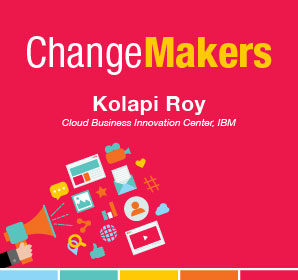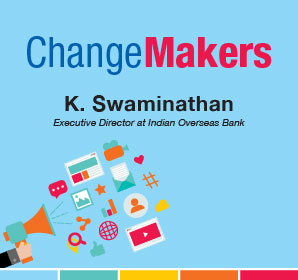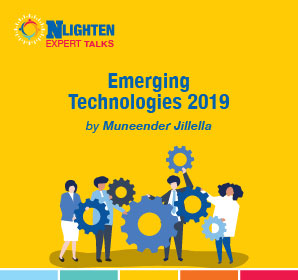This article is about Cloud Computing
Virtualization in Cloud Computing and their Types
By NIIT Editorial
Published on 19/10/2021
8 minutes
The advancements in technology have influenced all businesses across the world. Tasks that took days to complete are now possible with just a click. These tasks become simple, more efficient, and effective with the induction of various technologies in business operations.
One such technological advancement is cloud computing. It has transformed the way of conducting business and has provided multiple ways and solutions to perform a task without worrying about the security of the data. It is reliable and improves the accuracy and efficiency of the work done. This article provides an overview of cloud computing.
Cloud Computing
Cloud computing technology provides access to computing services like storage, software, servers, intelligence, analytics, and databases. It is achievable through the internet (cloud) for better work efficiency, flexible resources, and faster innovation.
One only needs to pay for the web services in cloud computing that help them minimize their operating costs, improve the efficiency of their business, and innovate their business as per the market requirements. Many people use mobile cloud computing for better convenience to complete their tasks. Facebook, Gmail, and Dropbox are some of the cloud computing examples.
Benefits of Cloud Computing
After the induction of cloud computing, there is a paradigm shift in the conduct of businesses. There are several benefits of cloud computing. Following are the prominent benefits that have a significant impact on businesses across the globe
- Cloud computing saves a lot of investment in software and hardware. It also reduces the cost of setting up infrastructure for data centers that include big servers, continuous flow of electricity for cooling and power, and IT professionals for handling the infrastructure. It is very cost-effective.
- Cloud computing services are often provided on-demand and offer self-service to businesses. Hence even the complex tasks are done within a few minutes. It provides flexibility while reducing their pressure and enables taking up more workload.
- It increases the scaling ability of the businesses profoundly. It means that the resources are allotted as per the business requirement at the right time and from the correct geographic location. These resources may include the amount of computing power, bandwidth, and storage.
- It provides a better alternative for on-site data centers that requires infrastructure needs like software, hardware set up, and other IT professional tasks. The businesses can focus on other important issues which might result in improved productivity.
- The most prominent cloud computing services like AWS cloud computing and Google cloud computing operate on secure databases, continuously updated with the latest efficient and fast computing hardware. It provides innumerous benefits regarding the performance of various tasks.
- Cloud computing allows disaster recovery and data back up. It also makes the continuity of businesses easier and cost-effective as the data can be made available at various sites on the cloud computing network.
- Most cloud providers offer a high level of security by implementing strict policies, controls, and technologies to protect the infrastructure, apps, and data of the companies from potential attacks.
Types of Cloud Computing
Businesses require a different kind of cloud computing according to their requirements. There are 3 types of clouds in cloud computing-
Public Cloud- A third-party cloud service provider hosts a public cloud that provides computing services like storage and servers through the internet. All the infrastructure needs, including software, hardware, and other computing services, are managed and owned by the cloud service provider. Businesses can use a web browser for the services and manage the account.
Private Cloud- The cloud computing resources only used by a single organization is called a private cloud. It can be placed physically on the organization’s data center. Some third-party service providers also manage few private clouds at the request of the organizations. In a private cloud, a private network maintains all the infrastructure and services.
Hybrid Cloud- As the name suggests, hybrid clouds are a combination of private and public clouds. A technology binds them together that enables them to share applications and data among themselves. This sharing of data between the clouds provides the businesses with more flexibility, more executing options. It also boosts the existing compliance, security, and infrastructure.
Types of Cloud Services
Cloud computing services fall into the following four categories-
Infrastructure as a Service (IaaS)
It is the most basic and widely used cloud computing service. Here, businesses can rent the IT infrastructure that includes networks, storage, operating systems, virtual machines (VR), and servers from a cloud service provider on a pre-pay basis.
Platform as a Service (PaaS)
It is a form of cloud computing service where services are based according to the requirement of the business. PaaS is designed especially for developers to focus on developing mobile apps or webs without any concerns for managing or setting up the infrastructure of databases, network, storage, and servers required for the development.
Serverless Computing
Serverless computing is very much similar to PaaS. It focuses on app development without wasting time on managing infrastructure and servers. The cloud service provider takes the responsibility of handling the setup, server management, and capacity planning. Serverless computing is event-driven and uses the resources only when it is required to do so.
Software as a Service (SaaS)
It is a type of cloud computing service in which software applications are delivered through the internet when required and follows a subscription model for payment. In SaaS, the cloud service providers manage and host the software applications and infrastructure. It also deals with maintenance such as security patching and software upgrades. Users generally use a web browser to connect to the application or server over the internet.
Applications of Cloud Computing
There are various applications of cloud computing across businesses. Following are some of the prime applications of cloud computing-
- It helps in minimizing the time and cost of application development owing to the use of cloud infrastructures.
- A cloud storage system stores a high amount of data and provides security, which is very cost-efficient and reliable. Moreover, the data usage is accessible from anywhere and anytime through the internet.
- Businesses can share data across divisions, locations, and teams with the help of the cloud.
- It enables organizations to use artificial intelligence to increase customer interaction and provide essential data for improvement in business strategy.
- It enables users to stream high-quality videos over the internet from anywhere and anytime.
Cloud computing
Data security is a prominent aspect of any business. Many organizations have shown concerns regarding data security in cloud computing, although security breaches are very rare. The security of cloud computing depends on the security of existing systems in the organizations.
The organizations must read the service level agreement properly to understand the security provided by the cloud service provider. It is essential to know who takes responsibility for data security. Organizations must enquire about the security infrastructure of the service providers and what they offer. It will help to avoid potential security breaches.
Virtual Cloud Computing
Virtual Cloud Computing refers to a method of separating service from its fundamental physical delivery. It involves developing a virtual form of physical things such as computer hardware and requires specialized software.
Virtual cloud computing enables multiple applications and software to operate on single hardware at the same time. It improves the flexibility and utilization of the hardware and reduces hardware usage, and is very cost-effective. It provides a virtual atmosphere for executing applications, networking, memory, and storage.
Types of Virtual Computing
· Server Virtual computing
· Desktop Virtual computing
· Data virtual computing
· Network Virtual computing
· Application Virtual computing
· Storage Virtual computing
Cloud Computing Courses in India
As businesses are opting for cloud computing services, it has opened numerous opportunities for individuals in the cloud computing field. Many people are moving ahead with cloud computing courses to make their careers in cloud computing.
Following are some of the courses available in cloud computing-
· Post-Graduate Program in Cloud Computing
· Cloud Computing Architecture Master’s Degree
· Postgraduate Certificate Program in Cloud Computing
· PG Certificate Program in Cloud Computing
Due to the pandemic, it has become very tough for students to attend colleges. Hence they are opting for online courses. Moreover, working professionals also prefer online courses. So there are many cloud computing courses online available for individuals. Many institutes provide online certification in cloud computing. These institutes offer enough cloud computing tutorials for individuals to understand cloud computing concepts clearly.
Big Data and Cloud Computing
Big Data is known for handling an enormous amount of data. It provides a mechanism to deal with a large amount of data.
Cloud computing and big data relationship can be divided based on the types of cloud computing services-
· IAAS in Public Cloud- It is a cost-effective cloud computing solution. Big data services use this service to access computing power and unlimited storage.
· PAAS in Private Cloud- PaaS sellers infuse Big Data technology in the services they offer. It saves them from the complexities of handling single hardware and software elements.
· SAAS in Hybrid Cloud- The companies need to analyze social media data for business analysis. SaaS sellers use Big Data to provide a platform to carry out the analysis.
Conclusion
Cloud computing is emerging as a new trend in businesses all over the world. Due to this, various institutes have started offering courses on cloud computing. Along with clearing cloud computing concepts, they also provide cloud computing training to their students.
AWS cloud computing and Google cloud computing are the two topmost and trusted cloud computing platforms in the cloud computing network. They have created several cloud computing jobs in the past few years. Hence one can opt for many cloud computing courses and make a successful career in this field.
PGP in Cloud Computing and SysOps
Become an industry-ready StackRoute Certified Cloud IT Administrator and get skilled to acquire all the critical competencies required to take on the role of a Cloud IT Administrator including building strong foundations as Systems administrator. This is a Job-Assured Program with a minimum CTC of ₹ 4LPA*
Job Assurance*
12 Weeks Program


 Sign In
Sign In































































































































































































































































































































































































